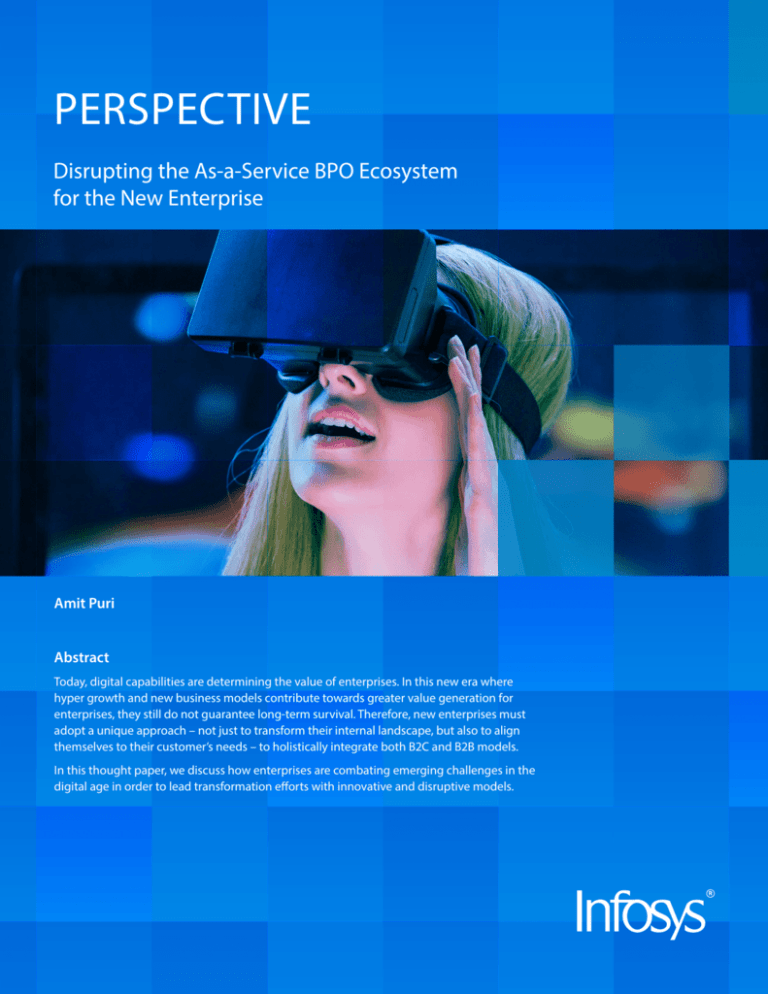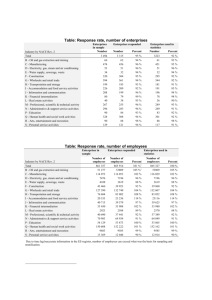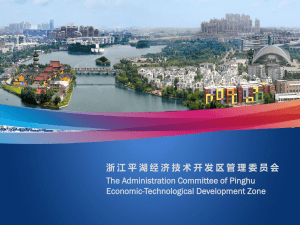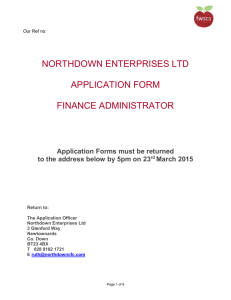
perspective
Disrupting the As-a-Service BPO Ecosystem
for the New Enterprise
Amit Puri
Abstract
Today, digital capabilities are determining the value of enterprises. In this new era where
hyper growth and new business models contribute towards greater value generation for
enterprises, they still do not guarantee long-term survival. Therefore, new enterprises must
adopt a unique approach – not just to transform their internal landscape, but also to align
themselves to their customer’s needs – to holistically integrate both B2C and B2B models.
In this thought paper, we discuss how enterprises are combating emerging challenges in the
digital age in order to lead transformation efforts with innovative and disruptive models.
“
Hi-tech, online,
and social media
companies have
already witnessed
a paradigm shift in
leveraging SaaSbased technologies
“
They cannot continue to work as two
separate entities as it limits synergy and
forward thinking amongst individuals.
The challenge – SaaS automation is not just about
implementing a cloud-based solution
The BPO industry is undergoing its
biggest seismic change ever as enterprises
reduce their reliance on labor-based
services and remove archaic, on-premise
technologies. Enterprises require widescale transformation of business processes
enabled by new technological tools and
platforms. As a result, there needs to be
a logical merger of business processes,
operations, infrastructure, and cloud
services to enable a fundamental shift
towards technology-driven services.
At the same time, companies do not have
the luxury of the conventional, five-year
improvement programs anymore. The
traditional mindset of large enterprises –
with CIOs and CFOs running independent
charters – needs to fundamentally change.
Having said that, hi-tech, online, and social
media companies have already witnessed
a paradigm shift in leveraging SaaS-based
technologies with new, cloud-based ERPs
and end-2-end stack solutions i.e. Workday,
NetSuite, Infor etc, that are now taking
on global majors such as Oracle and SAP.
Ultimately though, it is not just about
implementing a radical, cloud-enabled
ERP or saving license costs – that is only
the first step. Companies today need to go
through requisite change management
and organizational redesign to maximize
benefits from their cloud solutions as a
single, seamlessly integrated service. Only
then can they align to a common goal and
support large-scale transformations across
the organization.
Seizing the opportunities of the digital age
Today, the digital storm is forcing changes
across businesses in an unprecedented
manner – such as technological and
social shifts, big data and cloud adoption,
concentration on the Internet-of-Things
(IoT), and new customer expectations
and behaviors. It is creating new trends,
disruptive entrants, and industry
evolutions. Although these new-age
External Document © 2016 Infosys Limited
technologies and never-seen-before
models are helping businesses adapt
faster and build new capabilities, but still
long-term survival remains unpredictable.
Further, despite huge valuations of
new-age digital companies, sustainable
revenues or profits seems suspect. This
scenario has given rise to an important
question for enterprises embarking on
digital transformation in the quest to seize
digital opportunities: where should they
invest to make digital transformation more
sustainable in order to reap its benefits in
the short and long-term? We believe the
answer lies in aligning business processes
to customer needs and adopting
As-a-service models.
processes – but fundamentally linking to
organization’s business models for greater
impact. Without such futuristic archetypes,
sustaining growth in the digital age will be
difficult as tools, platforms, and processes
will need to cater together to the
new ecosystem.
However, this does not mean that
companies should simply outsource
everything. Rather, enterprises should
adopt sustainable, balanced models
that combine in-house initiatives and
partnerships with global service providers.
Aligning business processes to sustain growth
We know from experience that any
transformation initiative must align
strategies with all systems and processes.
There are several examples of companies
that falter due to insufficient focus on
optimizing basic functions, such as finance
and accounting, procurement, supply
chain, human resources, or even internal
productivity processes. Therefore, for a
successful digital transformation effort,
for enterprises to adopt sustainable
organizational models that combines
newer systems-of-engagement themes
with the traditional systems-of-record,
is essential.
The BPO industry is preparing itself to
enable successful digital transformations
with newer Digital-BPO models. These
models are designed to support the rapid
growth in digital technology with critical
linkages to not just managing core business
It is similar to the first technology bubble
burst in the year 2000. Essentially, no one
knew when things could go wrong, and
how fast. New tech startups are hitting
the `unicorn club’ ($1 billion+ valuations)
and yet growing with a lot of turbulence.
Yes, there are great stories with the likes
of Uber, Facebook, Spotify, Waze, and
Airbnb; but then again, look at companies
like Groupon and Twitter that are simply
struggling to effectively turnaround their
business models, beat the competition and
scale. This extends to even earlier titans
like HP, Cisco, Intel etc, who are facing the
heat. It is like the tech-hype-cycle that can
deflate very quickly. The digital ecosystem
will change things not just for billions of
consumers, but also equally for companies
and how they adapt to new business
models that align simultaneously with
investors, employees, and customers.
As-a-Service ecosystem for sustained advantage
As-a-Service ecosystem means different
things to different people and is a concept
that companies are only now beginning
to embrace. Nevertheless, its adoption is
growing and becoming more disruptive.
Today, enterprises are not just thinking of
outsourcing a basic order management
process; instead, they want to outsource
underlying ERP systems, application
support frameworks, and infrastructure in
their entirety. In addition, they would like
to add analytics, robotics-led automation,
design thinking elements, and more to
the mix, in order to improve the entire
customer service journey. Of course, we are
now seeing global service providers offer
these type of models on a per-transaction
fee, with cost and operational risk as
variables, and in some cases, even taking
over a significant share of business risk.
From a provider’s perspective, it is
linchpin for them to enable enterprises
to successfully leapfrog into the digital
ecosystem. This is a strong partnership
that benefits their business models. Once
this is established, providers will have the
wherewithal to create unique, industryspecific platforms, and competitive
differentiation. However, this groundbreaker
for innovation would also disrupt traditional
models and trigger an evolution in the BPO
industry. Providers will be forced to think
beyond just Business Process-as-a-Service
(BPaaS) / cloud-enabled platforms, rather
migrate to industry-specific platforms built
around specific industry domains.
External Document © 2016 Infosys Limited
Business Process Industry Platform-as-a-Service (BPIPS)
As of today, many of our clients have begun
reshaping conventional outsourcing models,
to combine business processes, application
development support, and infrastructure
around cloud-based models, to embrace
As-a-Service paradigms. Emerging enterprises
want to ensure a wide-scale transformation
of business processes, enabled by new
technology tools / platforms.
As-a-Service models will logically merge
operations, infrastructure, and cloud
services to accelerate the fundamental
shift towards technology-driven services
and persona-based user experience. By
combining industry platforms, software, and
services, leveraging BPIPS framework will
help build viable business models that will
both deliver value to clients and grow new
revenue streams. This will help enterprises
to digitally reimagine and manage business
processes and bring in ways that are more
effective in predicting and forecasting
demand. This new approach will also enable
enterprises to migrate to pre-packaged,
plug-and-play models that are on-demand
and driven by technology-enabled services
to achieve increased ROI in a much shorter
implementation time frame.
This is a new landscape for system integrators
and they will need to exhibit agility and
foresight to steer enterprises in the right
direction, by bringing together elements of
BPO operations, infrastructure, technology
support, and organizational realignment
to offer “Consult-2-Operate” value themes
– where this also allows global SI’s to get
closer to their end customers through Zero
Distance-led innovation programs. With such
newer thinking and approach, enterprises
will have a better chance of leading digital
transformation for desired impact and
success. This new way of integrating various
technology-and-process elements has given
rise to companies now beginning to embrace
technology-stack solutions around FAO-as-aService, Procurement-as-a-Service, HRO-as-aService, Analytics-as-a-Service,
and related models.
“
Conclusion
Without doubt, the digital ecosystem offers tremendous opportunities for
enterprises to get closer to customers by leveraging seamless integration between
business and technology. This could be further driven by design-thinking led
automation to innovate and maximize TCO impact. Ultimately, enterprises will
see huge benefits of shifting from legacy/on-premise to cloud delivery and
monetization models. This will impact major BPO support elements like Finance, HR,
Procurement, Sales & Fulfilment, Customer Service etc, where both IT infrastructure
and process support will move to a culture of technology-driven services, hence
making “As-a-Service” models more effective and easier to implement. Long-term
survival of enterprises depends on their ability to lead with this type of innovation,
be more bold and relentless, and their willingness to disrupt traditional IT and BPO
services models to accelerate growth.
About the Author
Amit Puri
“
Portfolio Sales Leader, Infosys BPO
Puri currently leads new revenue and growth initiatives to accelerate the pace of transformational growth
for Infosys BPO. He is a seasoned industry executive, with a proven track record and a strong background in
outsourcing (IT / BPO) and technology domains, having led sales, business development, and P&L leadership
roles across global SIs and in startup environments.
Prior to his joining Infosys, he was founder of a silicon-valley startup to build the next gen BPaaS / platform-BPO.
Earlier, he has held various senior management roles with Genpact, Oracle, and HCL- Hewlett Packard in the
US and Asia-Pacific to drive global sales growth and building strategic client relationships, and incubating key
alliances for technology and services partner ecosystem.
Puri holds an MBA in Marketing from Kellogg School of Management, Northwestern University, and a BE from
Delhi College of Engineering, University of Delhi.
He is based out of San Francisco Bay Area, CA and can be reached at puri_amit@infosys.com.
For more information, contact infosysbpo@infosys.com
© 2015 Infosys Limited, Bangalore, India. All Rights Reserved. Infosys believes the information in this document is accurate as of its publication date; such information is subject to change without notice. Infosys
acknowledges the proprietary rights of other companies to the trademarks, product names and such other intellectual property rights mentioned in this document. Except as expressly permitted, neither this
documentation nor any part of it may be reproduced, stored in a retrieval system, or transmitted in any form or by any means, electronic, mechanical, printing, photocopying, recording or otherwise, without the
prior permission of Infosys Limited and/ or any named intellectual property rights holders under this document.
Stay Connected








